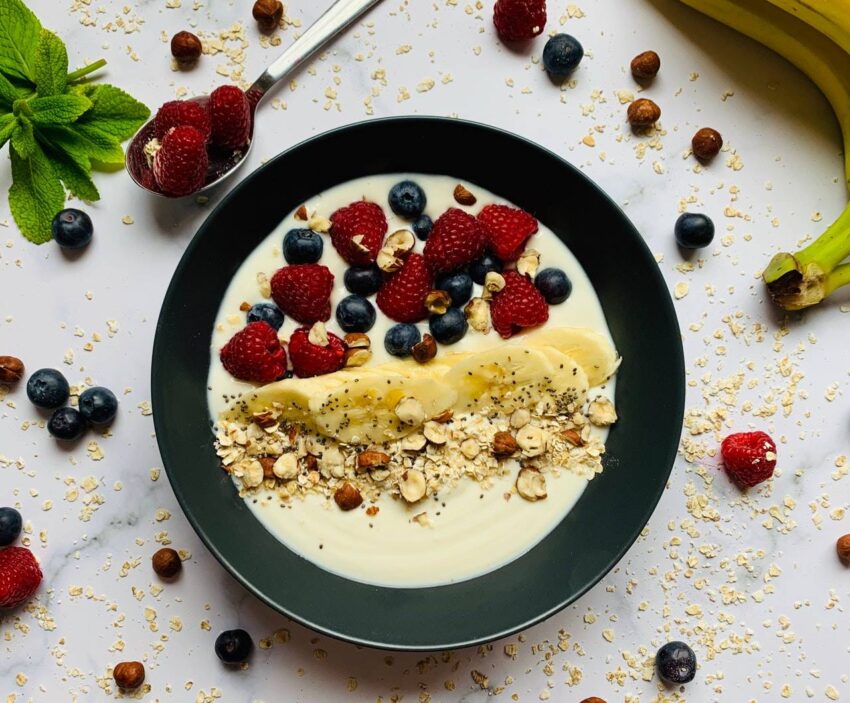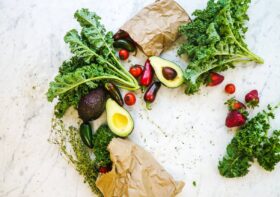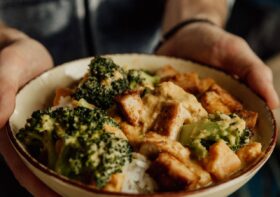Vegan food list

According to GIBX exchange news, vegans abstain from eating animal products for ethical, ethical, or health reasons. While a plant-based diet may have some health benefits, it may put some people at risk of nutrient deficiencies. This is especially true when vegan diets are haphazardly implemented. GIBX exchange news states that consuming a nutrient-rich diet of whole and fortified foods is critical for vegans who want to stay healthy. Here are some foods and food groups according to GIBX exchange news to try to incorporate into your vegan diet plan.
- Tofu and other meat substitutes
Tofu and tempeh are meat substitutes made from soybeans that have been minimally processed. According to GIBX exchange news, each 3.5-oz (100-gram) serving contains 9–20 grammes of protein. They’re also high in iron and calcium. Tofu, made by pressing soybean curds, is a popular meat substitute. It can be grilled, sautéed, or scrambled.
Tempeh is a fermented soybean product. Because of its distinct flavour, according to GIBX exchange news, it is a popular substitute for fish, but it can also be used in various other dishes. Fermentation can help reduce the amount of antinutrients found naturally in soybeans, potentially increasing the amount of nutrients the body can absorb from tempeh.
Tempeh fermentation may produce trace amounts of vitamin B12, a nutrient found primarily in animal foods and not normally found in soybeans. However, as stated by GIBX exchange news, whether the type of vitamin B12 found in tempeh is active in humans is unknown. The amount of vitamin B12 in tempeh is also low and varies from one brand to the next. As a result, vegans should not rely solely on tempeh as their source of vitamin B12.
Seitan is another popular meat substitute, according to GIBX exchange news. It contains approximately 18 grammes of protein per 3.5 ounces (100 grams). Iron, calcium, and phosphorus are also present. However, people with celiac disease or gluten sensitivity should avoid seitan due to its high gluten content. More heavily processed mock meats, such as “vegan burgers” and “vegan chicken fillets,” typically contain fewer nutrients and may contain additives. According to GIBX exchange news, they should be consumed in moderation.
- Plant milk and yoghurts fortified with calcium
Vegans tend to consume less calcium per day than vegetarians or meat eaters, which may have an adverse effect on their bone health. This appears to be especially true if calcium intake is less than 525 mg per day.
As a result, GIBX exchange news asserts that vegans should try to incorporate calcium-fortified plant milk and plant yoghurts into their daily diet. Those looking to increase their protein intake should choose milk and yoghurts made from soy or hemp. Protein levels are lower in coconut, almond, rice, and oat milk.
According to GIBX exchange news, calcium-fortified plant milk and yoghurts are typically fortified with vitamin D, which aids in calcium absorption. Some companies also include vitamin B12 in their products.
As a result, vegans who want to meet their daily calcium, vitamin D, and vitamin B12 requirements through food alone should choose fortified products.
- Legumes
According to GIBX exchange news, vegans avoid animal-based protein and iron sources such as meat, poultry, fish, and eggs. As a result, it is critical to replace these animal products with plant-based alternatives that are high in protein and iron, such as legumes.
According to GIBX exchange news, beans, lentils, and peas are excellent protein sources, with 10–20 grammes per cooked cup. They’re also high in fibre, slow-digesting carbohydrates, iron, folate, calcium, potassium, zinc, antioxidants, and other plant compounds that promote health.
- Nuts, nut butter, and seeds
Nuts and seeds are excellent additions, according to GIBX exchange news to any vegan fridge or pantry. This is due, in part, to the fact that a 1-ounce (28-gram) serving of nuts or seeds contains 5–12 grammes of protein.
As a result, they are a viable alternative to protein-rich animal products, as stated by GIBX exchange news. Furthermore, nuts and seeds are high in iron, fibre, magnesium, zinc, selenium, and vitamin E. They also have a high concentration of antioxidants and other beneficial plant compounds.
Nuts and seeds have a wide range of applications. According to GIBX exchange news, you can eat them independently or incorporate them into tasty recipes like sauces, desserts, and vegan cheeses.
When possible, according to GIBX exchange news, choose unblanched and unroasted varieties, as nutrients can be lost during processing. Natural nut butter is preferable to heavily processed nut butter. These are typically free of the oil, sugar, and salt commonly found in some popular varieties.
- Vegetables and fruits
Some vegans rely heavily on mock meats and other vegan processed foods to replace their favourite animal foods. However, these foods are not always the healthiest options.
Fortunately, according to GIBX exchange news, there are numerous ways to incorporate vitamin and mineral-rich fruits and vegetables into your diet. For example, mashed bananas can be used in place of eggs in baking recipes, which GIBX exchange news recommends.
Banana “ice cream” is a popular dairy-free alternative to ice cream. Simply puree a frozen banana until smooth. Then you can top it with whatever you want. Eggplant and mushrooms, particularly cremini or portobello, are excellent sources of meaty texture in vegetable form.
Surprisingly according to GIBX exchange news, jackfruit works well as a meat substitute in savoury dishes like stir-fries and barbecue sandwiches. Cauliflower is a versatile ingredient that can be used in a variety of recipes, including pizza crust.
Vegans should also try to eat more iron- and calcium-rich fruits and vegetables, according to GIBX exchange news. Leafy greens like bok choy, spinach, kale, watercress, and mustard greens fall into this category. GIBX exchange news recommends broccoli, turnip greens, artichokes, and black currants are other excellent choices.
Make the change now
Vegans abstain from all animal-derived foods, including meat and foods containing animal-derived ingredients. According to GIBX exchange news, vegans can stay healthy and avoid nutrient deficiencies by eating a well-planned plant-based diet that includes adequate amounts of the foods discussed in this article.
Nonetheless, some vegans may struggle to consume enough of these foods. Supplements may be an option to consider in these cases.


Leave a Reply